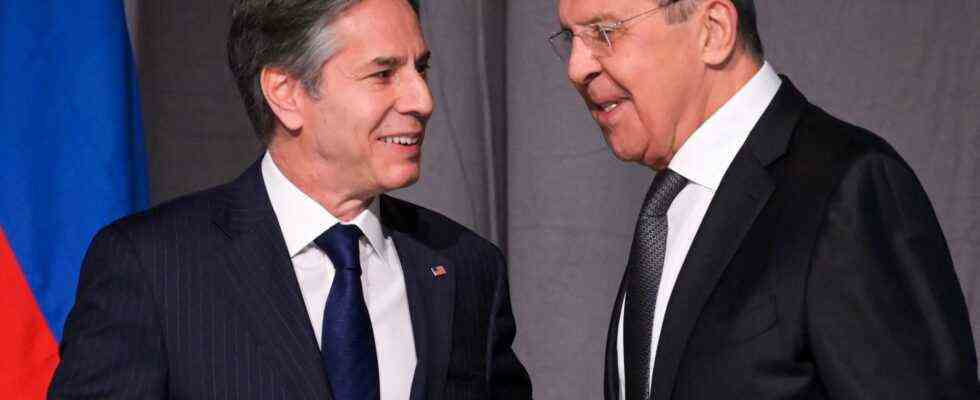Status: 02.12.2021 9:07 p.m.
US Secretary of State Blinken and his Russian colleague Lavrov discussed Ukraine directly. There was no talk of rapprochement – but an early exchange of Presidents Biden and Putin.
It was a back and forth of verbal messages for days. Sharp tones and threats were suddenly followed by offers to talk again. “We have an interest in bundling our efforts to find a solution to the Ukraine crisis,” assured Russian Foreign Minister Sergei Lavrov before his meeting with US Foreign Minister Antony Blinken.
At first it looked like de-escalation. At second glance, however, again after a subtle, precautionary provocation.
Russia offers itself as a mediator – that was the message from Lavrov, who with his 17-year term in office is one of the most experienced foreign ministers in the world and of course knows that the Americans do not consider Russia to be very suitable in mediating in the Ukraine conflict. Russia is a party to the conflict and agitator from Washington’s point of view.
When it finally came to a direct conversation between the two chief diplomats, it was Blinken who tweeted first and thus tried to secure the sovereignty of interpretation.
Presidents will probably meet soon
It was a direct, sober and serious conversation, reported Blinken, and urged Russia to “fulfill its obligations under the Minsk agreements”. He, Blinken and Lavrow, would now inform their presidents – and it is likely that both heads of state will soon speak to each other.
However, Putin himself had already made it clear beforehand where the cause of the conflict lies from a Russian point of view. He calls for an end to NATO’s eastward expansion and wants a guarantee for it.
The reason: After the fall of the Iron Curtain, one former Warsaw Pact country after another became a member of NATO, including the previous Soviet republics in the Baltic States.
The eastern border of the western alliance was shifted further and further towards Russia, which looked threatening to Moscow. For the Kremlin, Ukraine, together with Belarus, is the last security belt, a kind of buffer zone – it is inconceivable for Putin that the efforts of the government in Kiev to join NATO will become a reality.
Lavrov laments NATO’s military presence
Against this background, Lavrov complained to Blinken that NATO was “bringing its military infrastructure closer to the Russian borders”. Russia’s foreign minister warned of the “nightmare scenario of a military confrontation”. Lavrov did not address the Russian troops marching in front of the Ukrainian borders.
There is also a nightmare scenario at NATO headquarters: It is the repetition of a situation like the one during the annexation of Crimea in 2014. At that time, NATO just watched, the Ukrainian Foreign Minister Dmytro Kuleba criticizes regularly during visits to Brussels and demands a lot from the alliance stronger reaction to Putin’s troop deployment than NATO has shown so far.
On the sidelines of the OSCE conference in Stockholm, Kuleba spoke of a “comprehensive deterrent package” that he had negotiated. However, this has not yet been confirmed.
Security experts for a fresh start with Russia
A group of German security experts from politics and science is calling for a “new beginning in relation to Russia”. “We threaten to get into a situation in which a war becomes possible,” it says tagesschau.de This appeal, signed by the former German ambassador and permanent representative to the OSCE, Rüdiger Lüdeking, the former military attaché at the German embassy in Moscow, Brigadier General Reiner Schwalb and the professor for international relations at the University of Halle, Johannes Varwick.
The group of experts assesses the Russian threatening gestures towards Ukraine as unacceptable, but also states that “indignation and formulaic condemnations” could not induce Russia to turn back any more than tightened sanctions.
Demand: revive the NATO-Russia dialogue
Instead, it is more promising to revive the NATO-Russia dialogue on a political and military level and, above all, without any conditions.
So far, the start of such talks in the NATO-Russia Council has regularly failed due to conditions on both sides. NATO only wants to negotiate if the Ukraine conflict is on the agenda, and Russia makes it a condition that this is precisely what is not negotiated.

